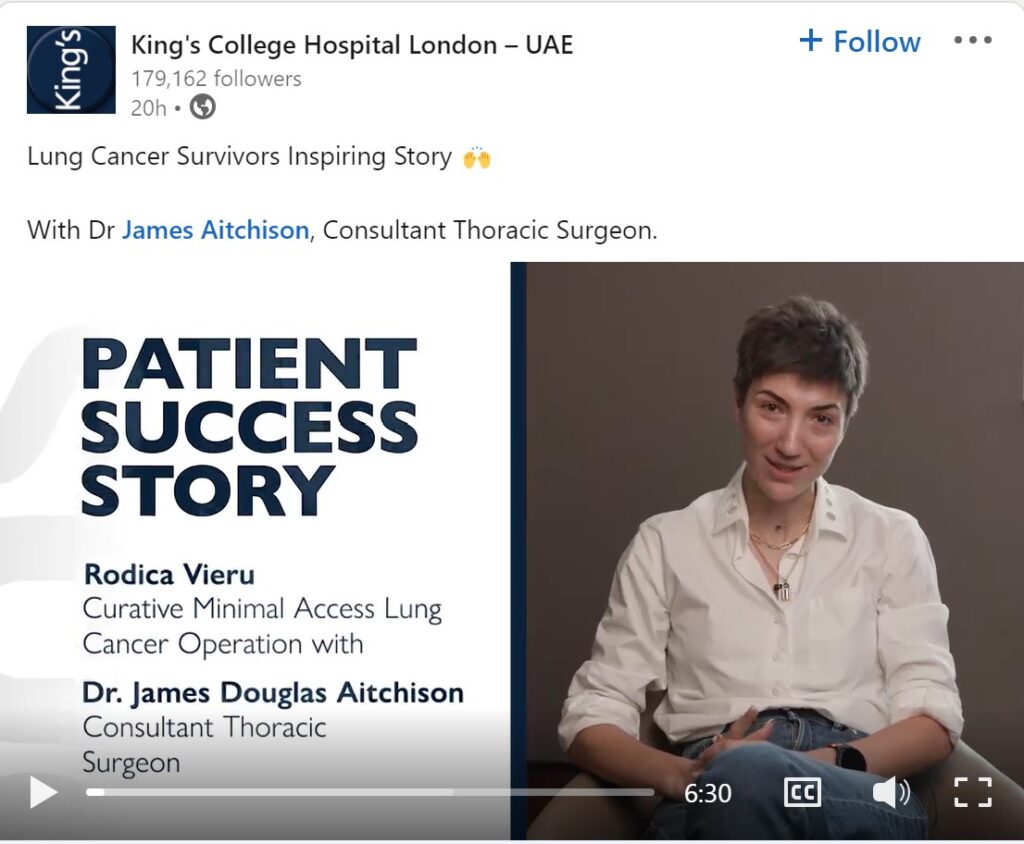
About Lung Cancer
What is Lung Cancer?
Lung cancer is when the cells that normally grow to keep the lungs healthy go wrong and divide without control, forming a growth or cancer or tumour – they all mean the same. As they grow, they can spread, first to other parts of the lung and chest, eventually to other parts around the body.
Lung cancer is the commonest cancer killer in the world. Over 35,000 people die every year from lung cancer in the UK, it causes over 1 in 5 of UK cancer deaths. As the UAE has a younger population than the UK, there are fewer cases of lung cancer, but over 200 were diagnosed and recorded here in 2022. Many of these have presented too late for curative treatment.
What Causes Lung Cancer?
Smoking is by far the biggest cause, responsible for over 90% of lung cancer, but you can get lung cancer even if you have never smoked – from other people’s smoking or some that is not related to smoking. Unfortunately some people are more prone to develop cancers than others and it can run in families in this way, even if they do not smoke.
What are the Problems / Symptoms?
The cancer growing in the lung is painless and in the earliest stages most people have no symptoms. At a later stage, symptoms include a cough that lasts for more than three weeks, coughing up blood, shortness of breath, chest pain, weight loss and problems from the spread around the body to the brain or liver or other areas. Most people with a cough have an infection and do not have lung cancer, but if you have a cough and smoked for a long time or it lasts for more than three weeks you should see your doctor. In the past in many countries, people have ignored the symptoms and the disease, worried that it is untreatable – so when they do seek help it is too late. This is the worst possible thing to do, because finding it early means it is very treatable.
How Can We Improve Treatment of Lung Cancer?
There are a lot of new treatments for lung cancer and some of these can work extremely well, even in the later stages of lung cancer. However, the first two things are:
• Stop smoking if possible
• Screening for lung cancer to detect it before there are any problems (symptoms)
What is Lung Cancer Screening?
In the early stages, lung cancer is potentially curable if it can be treated before it has started to spread.
Screening means looking for disease in people who are at higher risk of the disease but who have no symptoms in order to identify and treat it earlier and hopefully cure it.
Screening is recommended for people aged 45-50 or over who have smoked for more than 20 years, along with people who have a family history of lung cancer, or severe emphysema or inflammatory lung diseases, all of which are associated with a significant increased risk of lung cancer. Up to 6% of people screened have been found to have lung cancer in UK trials.
Screening can be done with a low dose non-contrast CT scan of the chest – no injection is required. Patients will have a baseline scan and a further two annual CT scans. These scans can be arranged at many hospitals in the UAE, including King’s College Hospital, which has a dedicated lung health and lung screening service. There is a small amount of radiation with this, but it is less than 6 months background radiation from living in the UK and only 2 months background radiation in Cornwall, or 10 international plane flights. Nobody says you shouldn’t live in Cornwall or fly to the USA because of the risks of radiation!
What Happens if a Lump is Detected?
The CT scan will show a nodule or lump in the lung but cannot tell what it is, whether it is benign, such as a scar from an old infection, or a new tumour. Certain small nodules will be watched on a second CT scan to see if they change and investigated only if they grow. Larger ones will have a biopsy taken, usually by bronchoscopy – a flexible tube through the nose or mouth into the windpipe and lung, or by a CT biopsy, where a needle is used in the scanner to take a sample of cells from the nodule. If the tissue is not cancer, no treatment may be required. If it is cancer, then plans for further tests to assess whether it has spread such as PET scan are required before an assessment at a chest MDT – multi-disciplinary meeting – with pulmonologists, radiologists, chest surgeons, medical and radiation oncologists – to advise on the best treatment advice for each patient individually.
How is Lung Cancer Treated?
By finding lung cancers when they are small and before they have spread outside the lung, it is likely they can be cured by surgery. With modern keyhole or minimal access techniques, many of the cancers can be removed with a small incision or incisions. The patient can go home in a few days and back to work or full activity within two weeks. At King’s, we can offer such surgery through these techniques, also known as thoracoscopy or video assisted thoracoscopic surgery.
Later stage more advanced lung cancer will need combined treatment with several different techniques which include surgery, radiotherapy, chemotherapy and immunotherapy.
By treating larger cancers earlier than they would have presented, then the cancer can be controlled even if not curable, reducing symptoms and prolonging healthy life.

